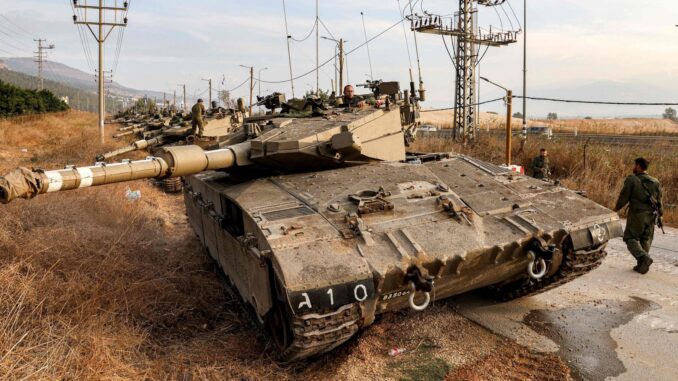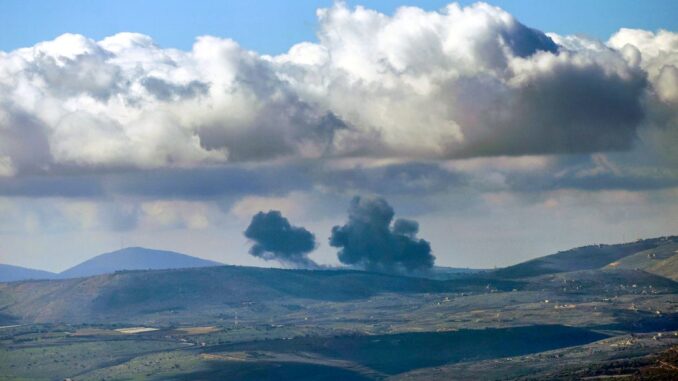Urgent call illustrates Washington’s attempts to prevent a widening war in the Middle East
By Vivian Salama, Dion Nissenbaum and Benoit Faucon, WSJ Dec. 23, 2023

Israeli soldiers guard near the border with Lebanon. The war between Israel and Hamas that ignited on Oct. 7 has also inflamed tensions on Israel’s northern border with Lebanon. PHOTO: AMIR LEVY/GETTY IMAGES
WASHINGTON—President Biden urged Israeli Prime Minister Benjamin Netanyahu to halt a pre-emptive strike against Hezbollah forces in Lebanon days after Hamas militants’ Oct. 7 assault on southern Israel, warning that such an attack could spark a wider regional war.
Israel had intelligence—which the U.S. deemed unreliable—that Hezbollah attackers were preparing to cross the border as part of a multipronged attack, pushing some of Israel’s more hawkish officials to the brink, officials said.
Israeli warplanes were in the air awaiting orders when Biden spoke to Netanyahu on Oct. 11 and told the Israeli prime minister to stand down and think through the consequences of such an action, according to people familiar with the call.
The Israeli attack didn’t go ahead. And the conversation between Biden and other U.S. officials and Netanyahu and his war cabinet—the details of which haven’t been previously reported—set a pattern of White House efforts to guard against any expansion of the conflict that could draw in the U.S.
A major focus of the Biden administration since Oct. 7 has been trying to prevent any escalation along Israel’s northern border with Lebanon, where Israeli forces trade fire almost daily with fighters from Iran-backed Shiite militant group Hezbollah and Palestinian militants. After the Hamas assault, the U.S. sent two aircraft carrier strike groups to the eastern Mediterranean, followed by a nuclear submarine, to bolster deterrence.
More recently, it created a special naval task force in the Red Sea to deal with attacks from Iran-backed Houthi militants in Yemen.
But diplomacy has been at the heart of Washington’s efforts. Amos Hochstein, the White House official leading the efforts to de-escalate tensions at the Israeli-Lebanese border, has ferried between Washington, Beirut and Jerusalem in an attempt to secure a diplomatic end to the fighting. France has also been heavily involved, pushing Lebanon to abide by U.N. Security Council resolution 1701, which calls for Hezbollah forces to pull out of southern Lebanon and stay at least 18 miles away from the Israel border.
The U.S. received its first indication of Israel’s proposed plans to pre-emptively strike the morning of Oct. 11 around 6:30 a.m. in Washington, when Israeli officials urgently notified the White House that they believed Hezbollah was planning an attack. Israel knew it couldn’t do it alone, U.S. officials said, and they asked for American support.
Biden’s top intelligence, military and national-security advisers—including CIA Director William Burns and Director of National Intelligence Avril Haines, Secretary of State Antony Blinken, Defense Secretary Lloyd Austin and Chairman of the Joint Chiefs CQ Brown—convened later that morning for a principal’s committee meeting, chaired by National Security Adviser Jake Sullivan, to discuss Israel’s proposed plans and determined that U.S. intelligence didn’t correspond with Israel’s.
After Biden was briefed, he got on a call with Netanyahu and his war cabinet urging Israel to stand down. Netanyahu wasn’t convinced, but members of his war cabinet, particularly Defense Minister Yoav Gallant, explained that a broader war was inevitable, and they wanted to get ahead of an attack. The U.S. pushed back, insisting that a bigger war could be averted.
After 45 minutes of discussion, Netanyahu ended the call saying he would discuss the matter with his cabinet, U.S. officials said.
Around the same time, northern Israel went on alert. Israeli soldiers on the northern border received urgent orders from their commanders that they should prepare to fight Hezbollah fighters paragliding and driving into the country from southern Lebanon. Israel sent out an alert for everyone in northern Israel to immediately head into bomb shelters.
It took about six hours of back-and-forth calls and meetings before Israeli officials agreed to stand down, as the U.S. insisted the intelligence didn’t suggest an imminent Hezbollah attack.
After getting pushback from Biden, Netanyahu and the war cabinet decided not to go forward with the major strike, U.S. and former Israeli officials said.
Officials in the Israeli prime minister’s office and at the Defense Ministry declined to comment.
Pentagon press secretary Patrick Ryder said the Pentagon remains concerned about tensions along the Israeli-Lebanese border but declined to comment on any specific conversations or intelligence matters. The CIA declined to comment. The State Department didn’t respond to a request for comment.
The risks of miscalculation on both sides of the border persist.

Smoke indicates areas in southern Lebanon where Israel bombarded enemies this month. PHOTO: JALAA MAREY/AGENCE FRANCE-PRESSE/GETTY IMAGES
Militants in Lebanon have hit Israel more than 200 times in attacks that have killed 10 people, including seven Israeli soldiers, according to data compiled by the Armed Conflict Location and Event Data Project. Israel has responded with nearly 1,000 strikes inside southern Lebanon that have killed more than 120 Hezbollah fighters and 10 Lebanese civilians.
On Friday, Hezbollah strikes killed one Israeli soldier and seriously wounded another, prompting counterstrikes by Israel into southern Lebanon. Israel on Saturday said it struck Hezbollah that morning and overnight, striking targets linked to the group’s infrastructure.
“The situation now, as everybody knows, it is tense,” Maj. Gen. Aroldo Lazaro Saenz, the Spanish officer who leads the U.N. peacekeeping mission in Lebanon, told reporters earlier this week in Beirut.
“The Americans would say: ‘Let’s explore these options diplomatically’ and Israel is probably much more saying: ‘OK, diplomacy is good, but without the use of force, you are not going to get where you want to go,’ ” said one Israeli official.
“We say: ‘Deterrence in the north and victory in the south,” the official said. “But it’s very dangerous and you could see an escalation, precisely because Hezbollah continues to act the way it does.’ ”
There are signs of progress in the diplomatic efforts, however. Lebanon Foreign Minister Abdallah Bou Habib has told French interlocutors that his country is ready to work on a deal, according to Lebanese officials.
And after more than two months of strikes that have delivered a significant blow to Hezbollah forces in Lebanon, Israeli officials also expressed optimism that the militant group would agree to withdraw its forces from the Israel-Lebanon border.
“The feeling is that this is doable now,” one of those officials said.
Write to Vivian Salama at vivian.salama@wsj.com, Dion Nissenbaum at dion.nissenbaum@wsj.com and Benoit Faucon at benoit.faucon@wsj.com



Leave a Reply
You must be logged in to post a comment.